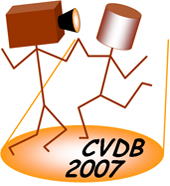
For years, multimedia researchers have been focusing largely on content-based retrieval. Unfortunately, there has not been enough data to approach realistic settings and many application scenarios have been quite hairy. Despite these difficulties, some elegant solutions have been proposed to media description, indexing, and retrieval. While the research community has focused on content-based access, however, content-based access to multimedia has never really caught on and the multimedia community has not seen much use of its results in in the real world.
On the other hand, recent trends appear to be changing the multimedia scene very significantly. These days, some enormous and extremely popular multimedia repositories already exist, such as Flickr, YouTube and DailyMotion. Many recent applications are helping to mature the economic model around multimedia. For a change, multimedia is meaning money. It is interesting to note, however, that almost all multimedia applications arousing interest today are solely relying on human-defined tags, and in fact have no real facilities for content-based access.
Needless to say, this new landscape is going to impact research. Multimedia researchers can now gain access to large data sets, with real usage profiles and key needs. But many questions arise, such as: Does this new multimedia scene increase or decrease the need for content-based access? Do we really believe tags are sufficient for our needs? Can tags ever capture all the information inside multimedia documents such as TV broadcasts, video footage, news, etc.? Do we need this information? Are any business models appearing for content-based access? And so on.
It is clear that content-based retrieval is unavoidable as soon as we consider multimedia as a valuable source of information. The panel will consider when content-based retrieval will move to the forefront and why it is not there now. Perhaps the key question is when and how research will be performed and money made on content-based multimedia access?
Dr. Wei-Ying Ma is a Principal Researcher at Microsoft Research Asia where he leads the Web Search & Data Mining Group. He currently serves as an Editor for the ACM/Springer Multimedia Systems Journal and Associate Editor for ACM Transactions on Information System (TOIS). He has served on the organizing and program committees of many international conferences including ACM Multimedia, SIGIR, CIKM, WWW, and was the general co-chair of the International Multimedia Modeling (MMM) Conference 2005 and International Conference on Image and Video Retrieval (CIVR) 2005. Over the course of his career, Wei-Ying has published 5 book chapters and over 150 international journal and conference papers.
Professor Edward Chang received his M.S. in Computer Science and PhD in Electrical Engineering at Stanford University in 1994 and 1999, respectively. He joined the department of Electrical & Computer Engineering at University of California, Santa Barbara, in September 1999. He received his tenure in March 2003, and was promoted to full professor of Electrical Engineering in 2006.
His recent research activities are in the areas of machine learning, data mining, high-dimensional data indexing, and their applications to image databases, video surveillance, and Web mining. Recent research contributions of his group include methods for learning image/video query concepts via active learning with kernel methods, formulating distance functions via dynamic associations and kernel alignment, managing and fusing distributed video-sensor data, categorizing and indexing high-dimensional image/video information, and speeding up Support Vector Machines via parallel matrix factorization and indexing.
Professor Chang has served on several ACM, IEEE, and SIAM conference program committees. He serves as an Associate Editor for IEEE Transactions on Knowledge and Data Engineering and ACM Multimedia Systems Journal. Professor Chang is a recipient of the IBM Faculty Partnership Award and the NSF Career Award. He is currently on leave from UC, serving as the director of research at Google/Beijing.
Amarnath received his Bachelor of Technology in Mechanical Engineering from the Indian Institute of Technology, Kharagpur, a Master of Science in Biomedical Engineering from University of Texas, Arlington, and his Ph.D. (Engineering) degree in Computer Science from Jadavpur University, India. Currently, he is the director of the Advanced Query Processing Laboratory in the Data and Knowledge Systems group at SDSC. His research interests include scientific data modeling, information integration, multimedia databases and spatiotemporal data management.
Amarnath is a member of the ACM and SIGMOD and has been in the program committee of several conferences in the area of data management. He has published over 70 papers in databases, and holds 9 patents in the area of multimedia data management. He is an associate editor of the upcoming Encyclopedia of Data Management.
Shin'ichi Satoh is a professor at National Institute of Informatics (NII), Japan. He is leading the video processing project at NII. He received his BE degree in 1987, his ME and PhD degrees in 1989 and 1992 from the University of Tokyo. His research interests include video analysis and multimedia database. He was a visiting scientist at the Robotics Institute, Carnegie Mellon University, from 1995 to 1997. He will serve as a program co-chair for Multimedia Modeling Conference (MMM2008) held in Kyoto in January 2008.